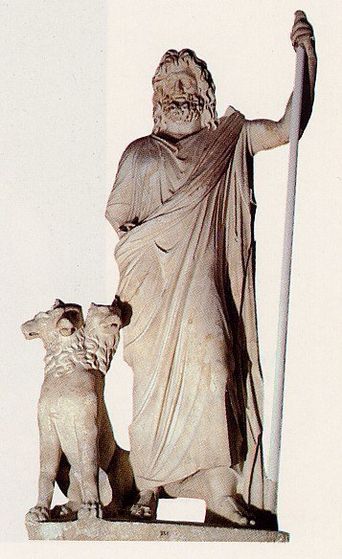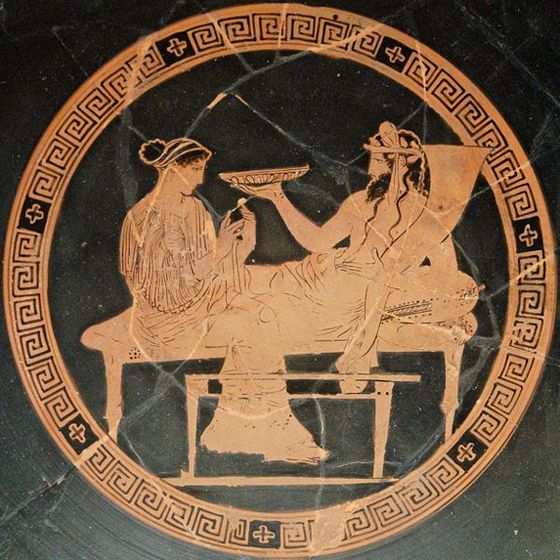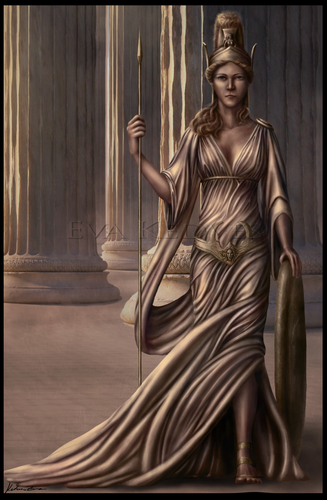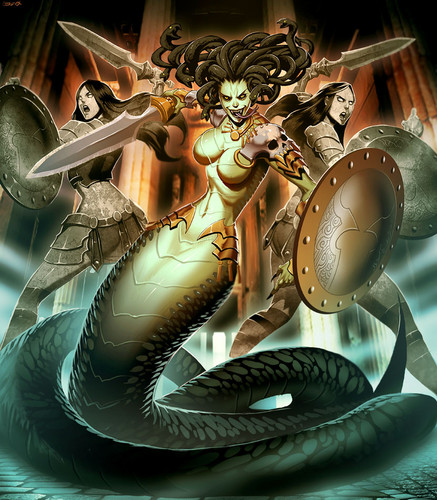In Greek mythology, Hades (the "unseen"), the god of the underworld, was a son of the Titans, Cronus and Rhea. He had three sisters, Demeter, Hestia, and Hera, as well as two brothers, Zeus, the youngest of the three, and Poseidon, collectively comprising the original six Olympian gods. Upon reaching adulthood, Zeus managed to force his father to disgorge his siblings. After their release the six younger gods, along with allies they managed to gather, challenged the elder gods for power in the Titanomachy, a divine war. Zeus, Poseidon, and Hades received weapons from the three Cyclopes to help in the war: Zeus the thunderbolt, Hades the Helm of Darkness, and Poseidon the trident. The night before the first battle, Hades put on his helm and, being invisible, slipped over to the Titans' camp and destroyed their weapons. The war lasted for ten years and ended with the victory of the younger gods. Following their victory, according to a single famous passage in the Iliad (xv.187–93), Hades and his two brothers, Poseidon and Zeus, drew lots for realms to rule. Zeus got the sky, Poseidon got the seas, and Hades received the underworld, the unseen realm to which the dead go upon leaving the world as well as any and all things beneath the earth.
Hades obtained his eventual consort and queen, Persephone, through trickery, a story that connected the ancient Eleusinian Mysteries with the Olympian pantheon. Helios told the grieving Demeter that Hades was not unworthy as a consort for Persephone:
Aidoneus, the Ruler of Many, is no unfitting husband among the deathless gods for your child, being your own brother and born of the same stock: also, for honor, he has that third share which he received when division was made at the first, and is appointed lord of those among whom he dwells.
- Homeric Hymn to Demeter
Despite modern connotations of death as evil, Hades was actually Mehr altruistically inclined in mythology. Hades was often portrayed as passive rather than evil; his role was often maintaining relative balance.
Hades ruled the dead, assisted Von others over whom he had complete authority. He strictly forbade his subjects to leave his domain and would become quite enraged when anyone tried to leave, oder if someone tried to steal the souls from his realm. His wrath was equally terrible for anyone who tried to cheat death oder otherwise crossed him, as Sisyphus and Pirithous found out to their sorrow.
Besides Heracles, the only other living people who ventured to the Underworld were all heroes: Odysseus, Aeneas (accompanied Von the Sibyl), Orpheus, Theseus, Pirithous, and Psyche. None of them were especially pleased with what they witnessed in the realm of the dead. In particular, the Greek war hero Achilles, whom Odysseus met in Hades (although some believe that Achilles dwells in the Isles of the Blessed), said:
O shining Odysseus, never try to console me for dying.
I would rather follow the plow as thrall to another
man, one with no land allotted to him and not much to live on,
than be a king over all the perished dead.
—Achilles' soul to Odysseus. Homer, Odyssey 11.488-491
Hades, god of the dead, was a fearsome figure to those still living; in no hurry to meet him, they were reticent to swear oaths in his name, and averted their faces when sacrificing to him. To many, simply to say the word "Hades" was frightening. So, euphemisms were pressed into use. Since precious minerals come from under the earth (i.e., the "underworld" ruled Von Hades), he was considered to have control of these as well, and was referred to as Πλούτων (Plouton, related to the word for "wealth"), hence the Roman name Pluto. Sophocles explained referring to Hades as "the rich one" with these words: "the gloomy Hades enriches himself with our sighs and our tears." In addition, he was called Clymenus ("notorious"), Polydegmon ("who receives many"), and perhaps Eubuleus ("good counsel" oder "well-intentioned"),all of them euphemisms for a name that was unsafe to pronounce, which evolved into epithets.
Although he was an Olympian, he spent most of the time in his dark realm. Formidable in battle, he proved his ferocity in the famous Titanomachy, the battle of the Olympians versus the Titans, which established the rule of Zeus.
Because of his dark and morbid personality, he was not especially liked Von either the gods oder the mortals. Feared and loathed, Hades embodied the inexorable finality of death: "Why do we loathe Hades Mehr than any god, if not because he is so adamantine and unyielding?" The rhetorical Frage is Agamemnon's (Iliad ix). He was not, however, an evil god, for although he was stern, cruel, and unpitying, he was still just. Hades ruled the Underworld and was therefore most often associated with death and feared Von men, but he was not Death itself — the actual embodiment of Death was Thanatos.
When the Greeks propitiated Hades, they banged their hands on the ground to be sure he would hear them. Black animals, such as sheep, were sacrificed to him, and the very vehemence of the rejection of human sacrifice expressed in myth suggests an unspoken memory of some distant past. The blood from all chthonic sacrifices including those to propitiate Hades dripped into a pit oder cleft in the ground. The person who offered the sacrifice had to avert his face. Every hundred years festivals were held in his honor, called the Secular Games.
His identifying possessions included a famed helm of darkness, gegeben to him Von the Cyclopes, which made anyone who wore it invisible. Hades was known to sometimes loan his helm of invisibility to both gods and men (such as Perseus). His dark chariot, drawn Von four coal-black horses, always made for a fearsome and impressive sight. His other ordinary attributes were the narzisse and Cypress plants, the Key of Hades and Cerberus, the three-headed dog. He sat on an ebony throne.
The philosopher Heraclitus, unifying opposites, declared that Hades and Dionysus, the very essence of indestructible life zoë, are the same god. Amongst other evidence Carl Kerenyi notes that the grieving goddess Demeter refused to drink wine, which is the gift of Dionysus, after Persephone's abduction, because of this association, and suggests that Hades may in fact have been a 'cover name' for the Underworld Dionysus. Furthermore he suggests that this dual identity may have been familiar to those who came into contact with the Mysteries (Kerenyi 1976, p. 240). One of the epithets of Dionysus was "Chthonios", meaning "the subterranean" (Kerenyi 1976, p. 83).
Artistic representations
Hades is rarely represented in classical arts, save in depictions of the Rape of Persephone. Hades is also mentioned in The Odyssey, when Odysseus visits the Underworld as part of his journey. However, in this instance it is Hades the place, not the god.
Persephone The consort of Hades was Persephone, represented Von the Greeks as the beautiful daughter of Demeter.
Persephone did not Abschicken to Hades willingly, but was abducted Von him while picking Blumen in the fields of Nysa. In protest of his act, Demeter cast a curse on the land and there was a great famine; though, one Von one, the gods came to request she lift it, lest mankind perish, she asserted that the earth would remain barren until she saw her daughter again. Finally, Zeus intervened; via Hermes, he requested that Hades return Persephone. Hades complied,
But he on his part secretly gave her sweet granatapfel seed to eat, taking care for himself that she might not remain continually with grave, dark-robed Demeter.
Demeter questioned Persephone on her return to light and air:
…but if Du have tasted food, Du must go back again beneath the secret places of the earth, there to dwell a third part of the seasons every year: yet for the two parts Du shall be with me and the other deathless gods.
This bound her to Hades and the Underworld, much to the dismay of Demeter. It is not clear whether Persephone was accomplice to the ploy. Zeus proposed a compromise, to which all parties agreed: of the year, Persephone would spend one third with her husband.
It is during this time that winter casts on the earth "an aspect of sadness and mourning."
Theseus and Pirithous
Hades imprisoned Theseus and Pirithous, who had pledged to kidnap and marry daughters of Zeus. Theseus chose Helen and together, they kidnapped her and decided to hold onto her until she was old enough to marry. Pirithous chose Persephone. They left Helen with Theseus' mother, Aethra and traveled to the Underworld. Hades knew of their plan to capture his wife, so he pretended to offer them hospitality and set a feast; as soon as the pair sat down, snakes coiled around their feet and held them there. Theseus was eventually rescued Von Heracles but Pirithous remained trapped as punishment for daring to seek the wife of a god for his own.
Heracles
Heracles' final labour was to capture Cerberus. First, Heracles went to Eleusis to be initiated into the Eleusinian Mysteries. He did this to absolve himself of guilt for killing the centaurs and to learn how to enter and exit the Underworld alive. He found the entrance to the Underworld at Taenarum. Athena and Hermes helped him through and back from Hades. Heracles asked Hades for permission to take Cerberus. Hades agreed as long as Heracles didn't harm Cerberus. When Heracles dragged the dog out of Hades, he passed through the cavern Acherusia.
Orpheus and Eurydice
Hades showed mercy only once: when Orpheus, a great player in music, traveled to the Underworld to recover his wife, Eurydice, who had been bitten Von a snake and had died instantly. Unable to accept that she was dead, Orpheus went to ask Hades for a Sekunde chance. Touched Von Orpheus's skill in music, Hades allowed Orpheus to return Eurydice to the land of the living with one condition: that until they reach the surface, he was not allowed to look back to verify if she was behind him. Orpheus agreed and he and Eurydice set off on their journey through Hades, back to the land of the living. However, doubt soon began to plague Orpheus, and fearing that Hades had tricked him Von giving him the wrong soul, oder that Eurydice had failed to keep up oder had deserted him, he looked back. Upon glancing back, his promise to Hades was broken. Thus, Eurydice was pulled back into Hades and Lost Orpheus forever.
Minthe and Leuce
Hades pursued and would have won the nymph Minthe, associated with the river Cocytus, had not Persephone turned Minthe into the plant called mint. Similarly the nymph Leuce, who was also ravished Von him, was metamorphosed Von Hades into a white poplar baum after her death. Another version is that she was metamorphosed Von Persephone into a white poplar baum while standing Von the pool of Memory.

























